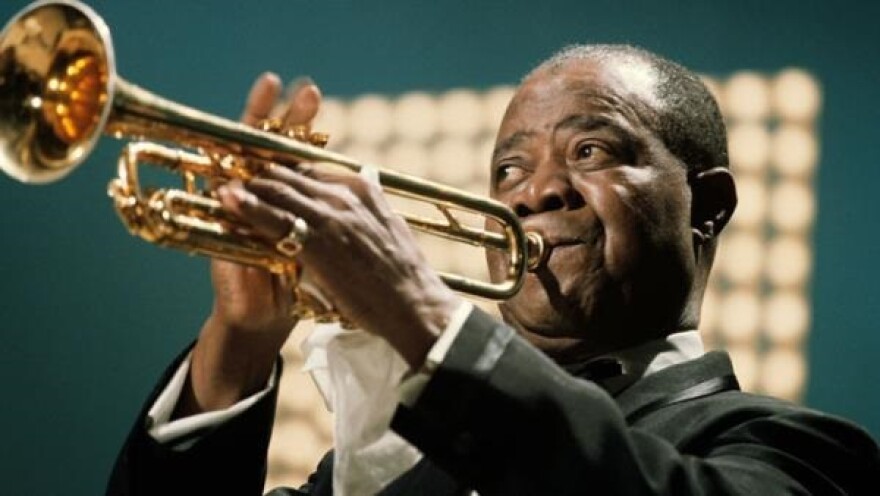Jazz is often described as the original American art form. Here are five choice cuts, by everyone from Louis Armstrong to Carla Bley, that make the connection explicit.
Louis Armstrong, “The Star Spangled Banner”
As long as he lived in the public eye, Louis Armstrong maintained that he was born on the Fourth of July. This was later called into question by official birth records, which tell us Pops came into the world on Aug. 4, 1901. But for many admirers, Armstrong remains a “firecracker baby,” as he liked to put it. Before COVID, the Louis Armstrong House Museum even held an annual birthday party, with cake, in Queens. All of which is to say that there can be no celebration of jazz on Independence Day without giving a place of honor to Armstrong, one of the first American musicians to show us what independence was all about. Here is our national anthem as sublimely played at the end of his set at the Newport Jazz Festival on July 4, 1960.
Carla Bley, “Looking For America”
The composer and pianist Carla Bley has always had a keen ear for a twisted anthem, and on her 2003 album Looking for America, she tackled the idea head-on. The album’s centerpiece is this fond, unruly medley, which filters the raw melodic material of “The Star Spangled Banner” through a sort of funhouse lens. A few years back I asked Bley about this track, which I see as an expression of affectionate irreverence. “Yes, thank you,” she replied, noting that some observers only catch the irreverent part. “I felt emotionally moved, while also making fun of it.”
Gary McFarland, “If I’m Elected…”
When I mentioned around the office that I was planning this edition of Take Five, WBGO’s own John Newcott asked if I was familiar with America the Beautiful, by Gary McFarland. I’m ashamed to say that I wasn’t — but I’ve done my part to catch up. McFarland, who died under mysterious circumstances in 1971, was a vibraphonist, composer-arranger and bandleader who made some of the first jazz-rock albums of the era. America the Beautiful: An Account of Its Disappearance was among his most ambitious, a big-band suite with a disillusioned air.
The imaginative slant of McFarland’s writing is clear throughout, and still startlingly relevant. (Listen to the marchlike phrase that appears four minutes into “If I’m Elected…,” and compare it to the opening of The New Breed, by guitarist Jeff Parker.) As for the relevance of the album’s themes, I’ll simply note that a reviewer for DownBeat recently pegged America the Beautiful, released in 1968, as “a thoughtful response to a country in turmoil.” No further comment.
The Army Blues Jazz Ensemble, “Conspiracy Theory”
Were you aware of the U.S. Army Blues, the premier jazz ensemble of the United States Army? An official component of the Army Band since 1972, it has appeared at major festivals, at marquee jazz clubs, and of course at the White House. The band’s roster is constantly changing, but the musicianship is unwavering.
By way of illustration, here’s an original composition by saxophonist Mike Tomaro, recorded at the ensemble’s 25th anniversary concert in 1997. Tomaro, who was a Sergeant First Class at the time, clearly draws inspiration from the Thad Jones-Mel Lewis Orchestra, and his bandmates do a fine job bringing the chart to life. He titled this tune “Conspiracy Theory,” but let’s not go searching for any hidden significance there. (That’s what they’d want you to think.)
Lester Young, “Flat Foot Floogie” and “I Haven’t Changed a Thing,” 1938
You probably don’t need to be reminded that Lester Young was The President of the tenor saxophone. You may not even need to be told that he appears in rare form on The Savory Collection, a revelatory trove of radio broadcasts that has been issued on Mosaic Records as a limited-edition 6-CD boxed set.
A couple of gems had to be omitted from the set, and Loren Schoenberg, the Savory Collection’s producer, scholar, guardian and sleuth supreme, was recently kind enough to post them to the SoundCloud link above. The first clip is an ebullient 32-bar solo on “Flat Foot Floogie,” recorded with the Count Basie Orchestra on Aug. 18, 1938; the second is a tantalizing pair of four-bar breaks on “I Haven’t Changed A Thing,” recorded with the same crew at the Famous Door six days earlier, on Aug. 12. As the kids say: Nothing but respect for MY president.







More Stories
Eric Gales՛s new album 2025, releases single with Buddy Guy & Roosevelt Collier: Video, CD cover
I usually practice with the door open. I always played like that, hoping someone would walk by and discover me: Ahmad Jamal once confessed: Video, Photos
Terry Riley. A landmark reissue of one of the most important figures in 20th-century music: Videos, Photos